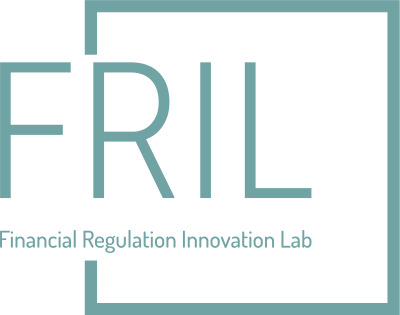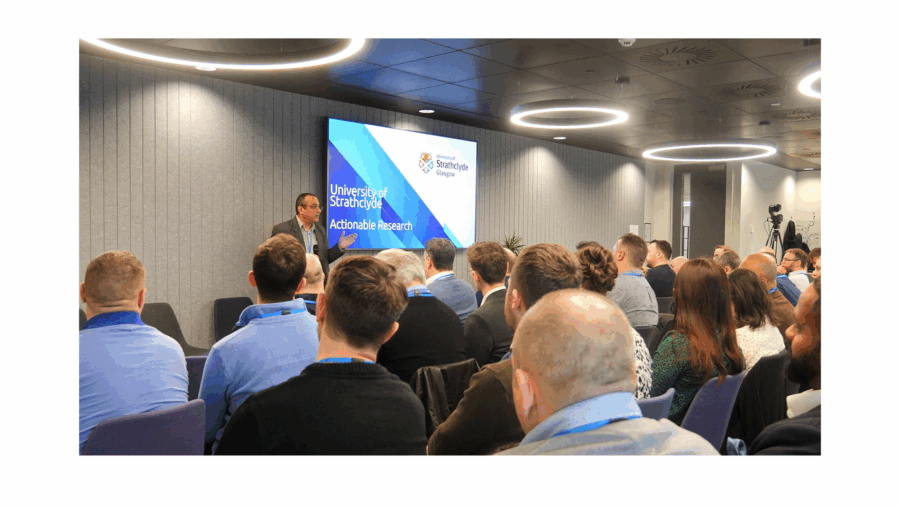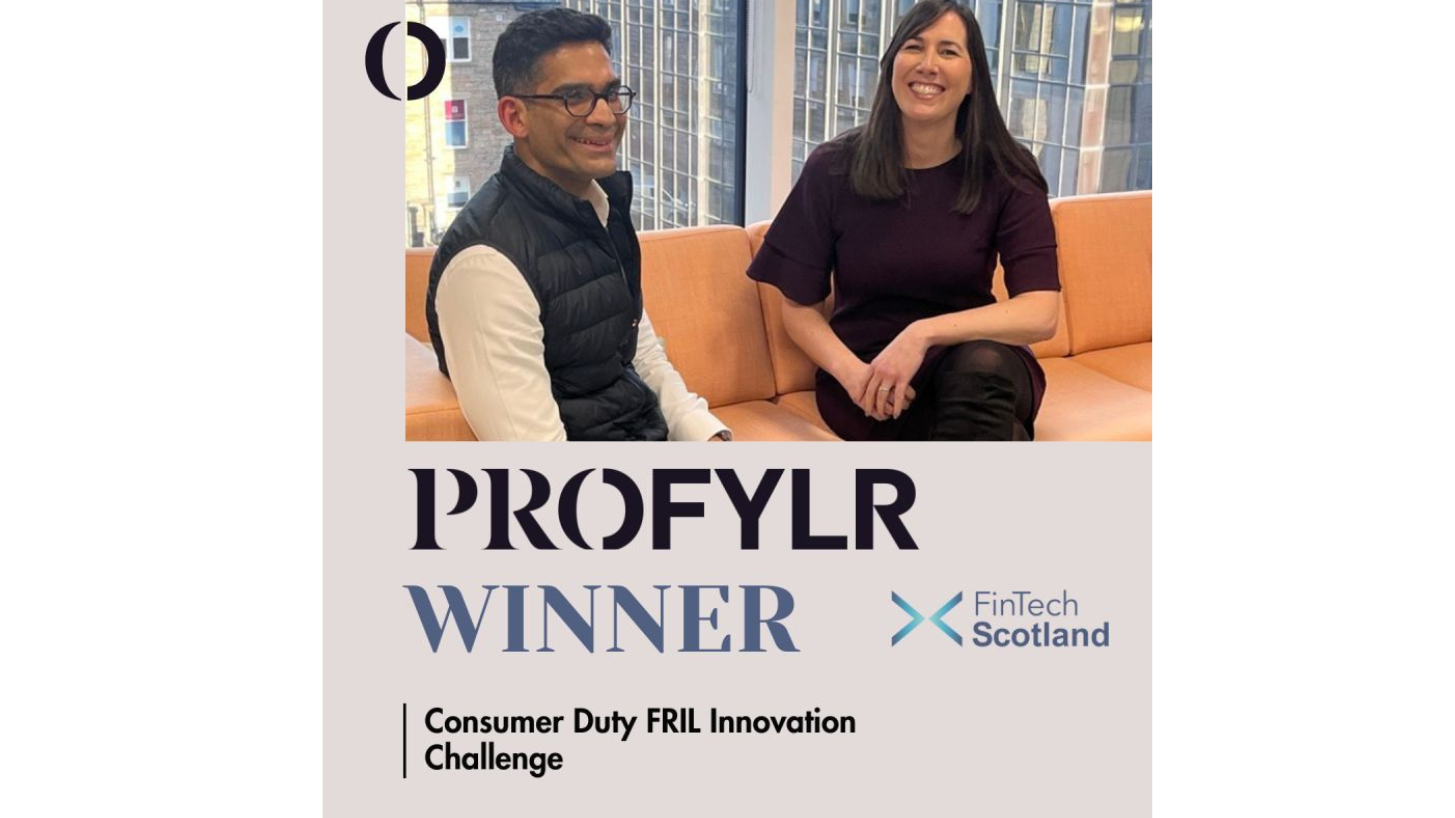Financial Regulation Innovation Lab (FRIL) Responsible Innovation Case Study: Inicio AI
FRIL: Supercharging Growth, Serving Society
At first glance, financial technology might seem like it’s all about algorithms, compliance, and data. But for Inicio AI, it’s about something far more human – empathy.
When FRIL launched its Optimising Consumer Outcomes Innovation Call, the goal was simple but ambitious: to put people, not processes, at the heart of financial innovation. The programme invited fintech startups, financial institutions, regulators, and academics to collaborate on solutions that would help customers make better, fairer financial decisions.
For Inicio AI, a company founded on inclusion and compassion, FRIL became the perfect catalyst. Through the programme, Inicio gained new commercial opportunities, accelerated product development, and deepened relationships with industry partners. But more importantly it did this while staying true to its mission of helping vulnerable customers in the most difficult of circumstances navigating financial systems with dignity, helping some to become debt-free more quickly and many more to find a way forward and out of their debt issues.
The Challenge: Smart and Kind Finance
The UK’s Financial Conduct Authority (FCA) introduced the Consumer Duty regulation to ensure financial firms act in the best interests of their customers. It raises expectations around transparency, fairness, and care – aiming to make financial services accessible and understandable for everyone, regardless of literacy or numeracy.
For many firms, meeting these standards is complex. Outdated systems and manual processes make it difficult to prove compliance and deliver consistently positive outcomes for customers. That’s where innovation and empathy come in.
Why addressing this challenge matters:
| For Industry | For Consumers |
| Consumer Duty means building trust, reducing risk, and designing services that genuinely support customers. | It means fair treatment, clear communication, and better support when it matters most – especially for those facing financial vulnerability. |
The Approach: Smarter Data, Smarter Solutions
FRIL’s Optimising Consumer Outcomes Innovation Call set out seven specific challenges exploring how technology, data, and analytics could help firms better understand their customers and improve outcomes.
By bringing together pioneering fintechs, leading financial institutions, regulators, and academics, FRIL created an environment for rapid experimentation and collaboration. Successful innovators like Inicio received early-stage funding and direct access to senior decision-makers inside major financial organisations – helping them test, refine, and accelerate their ideas for market.
For Inicio AI, this meant moving faster, learning more, and making a bigger impact than ever
before.
The Case Study: Inicio AI’s Story – Empathy in Action
Inicio AI was founded with a powerful human story at its heart.
“The company was originally founded because of a story involving a pregnant woman who was, sadly, trying to take her own life. She was in debt and struggling to fill in a financial form to confirm her affordability. She’d been sent paper and digital forms to complete on her own but found it intimidating. She’d also tried a phone call, but that was embarrassing. She abandoned it and became stuck”. — explains Rachel Curtis, CEO of Inicio AI

That experience inspired Budgie – a gentle, virtual agent that helps people complete affordability forms any time of day or night, offering the reassurance and support they need to get it done.
Budgie turns what can be an intimidating process into a supportive experience. It listens, guides, and reassures – empowering users to take back control of their finances.
Originally focused on debt management in the UK, Budgie’s reach has since expanded into new lending, mortgage applications, and financial advice nationally and in future will expand internationally.
And the impact has been profound.
“There was a young couple in their early 20s with about £1,200 of debt. They used Budgie, and through one of our partners – a benefits calculator – they discovered they were missing out on £340 a month in benefits. It meant they could be debt-free in four months. That customer outcome was fantastic”. — says Rachel.
The Impact of FRIL: Bigger, Better, Faster
At its heart, FRIL champions finance for good. This means supporting innovators who use technology to create positive social change. For Inicio, the programme offered access, insight, and momentum.
“It’s the faster pace of insights, innovation and collaboration that you get from being part of FRIL. What we achieved was bigger, better and faster than trying to do it on our own”. — says Rachel.
Through FRIL, Inicio gained direct access to major financial institutions – not through cold calls, but through open, honest conversations where senior leaders shared real challenges and insights.
“It brought together the companies we were trying to approach and sell our product to, but in a very honest environment. They shared their challenges, and these were senior people in those companies. Outside of FRIL, when you’re trying to make initial sales calls, it can be hard to get those conversations”. — explains Rachel.
That openness, combined with structured support, helped the team refine and shape Budgie to meet real-world needs.
“This challenge is a great opportunity to harness fintech innovation, and apply that in how we support customer outcomes at every stage of their financial lives”. — Will Kerr, Head of Good Customer Outcomes, NatWest Group.
“It ticked all the boxes. It was an efficient, focused resource for my team to really understand what challenges existed in the regulatory space, so we could come back with a clear proposal on how to solve
them”. — says Rachel.
And the collaboration didn’t end there. Inicio joined forces with fellow fintechs in the FRIL cohort, including TellJO, to combine their tools and tackle even bigger problems together.
“We ended up working with other fintechs such as TellJO, plugging our solutions together to solve bigger problems in better ways. It was a really lovely, positive outcome we didn’t expect”. — explains Rachel.
Inicio stats
| Sector | Fintech |
| Employees | 15 |
| Turnover | Early revenue, expanding into B2B and B2C markets |
| Location | England , Scotland |
The Ambition – Redefining what is possible
For Rachel and her team, FRIL was never just about funding. It was about growing within a supportive, purpose-driven ecosystem.
“It did fundamentally change our approach to partnerships. What FRIL helped us do was look at the broader problem the consumer was trying to solve, because we saw that very clearly through the eyes of the organisations. They were turning up and saying, ‘Our consumers are struggling with this,’ or ‘From a regulatory perspective, we’ve got to meet these requirements – but we have to do it in a way that delivers good outcomes”. — adds Rachel.
Inicio AI continues to expand Budgie’s reach, forming new partnerships and exploring wider use cases – all grounded in the same mission that started it: making financial life easier, fairer, and more human.
The Outcomes – Impact
In just a few months, FRIL enabled Inicio AI to refine their product, deepen their market understanding, and build meaningful partnerships across industry and academia.
Impact summary
- 1 x product refinement sprint completed in 12 weeks.
- New partnerships established (industry and fintech)
- New clients secured
- Increased confidence, visibility, and collaboration in the fintech ecosystem.
Case Study Conclusion
Inicio’s journey with FRIL shows what happens when innovation and empathy come together. Through collaboration, insight, and the courage to think differently, Inicio created technology that doesn’t just tick boxes – it changes lives.
For FRIL, this is exactly what “finance for good” means: empowering innovators to build a financial system that is smarter, fairer, and above all, kinder. Through collaboration, insight, and compassion, FRIL is proving that when innovation meets regulation – and when both start from human need – everyone wins.

About FRIL
FRIL is part of the larger Glasgow City Region Innovation Accelerator programme with Glasgow, one of three pilot regions’ – including West Midlands – sharing a £100m investment aimed at transforming R&D within the UK. Led by Innovate UK, and delivered by Fintech Scotland in partnership with the University of Strathclyde and the University of Glasgow, this programme supports the UK Government’s levelling-up agenda by empowering local regions to drive economic growth through innovation. This approach not only supports regional development but also positions the UK as a leader in the global innovation landscape.
Download the Inicio AI case study.
Financial Regulation Innovation Lab (FRIL) Responsible Innovation Case Study: CienDos
Shaping the future of ESG (Environmental, Social and Governance Measurement and Reporting) in Financial Services
In today’s world, doing good for the planet is no longer simply a personal preference moral it’s a business imperative. Financial institutions are increasingly being asked not how much they earn, but how they earn it.
That’s where CienDos, a Glasgow-based fintech co-founded by Jules Salmond, comes in. The company helps banks and businesses understand the environmental impact of their financial decisions turning complex data relating to carbon emissions into clear, actionable insights.
When FRIL launched its ESG Innovation Call, CienDos saw a chance to accelerate its mission. Through the programme, the team developed its Financed Emissions Calculator™ and created a Sustainable Transition Plan, collaborating with major players like HSBC, Virgin Money, and Equifax.
The impact was immediate, FRIL gave CienDos early access to the market, boosted its credibility, and opened doors to new partnerships. The company retained talented interns, expanded into European markets, and strengthened its position as a leader in sustainable finance innovation.
But beyond business success, CienDos is a testament to how FRIL is helping to root fintech growth in Glasgow, showcasing the city as a rising global hub for sustainability innovation.
The Challenge: Making Carbon Data Simple
As the demand for environmental accountability grows, financial institutions face new expectations. They must measure and report their ESGperformance, not just profits.
But collecting and analysing ESG data isn’t easy. It often involves navigating fragmented data sources, inconsistent standards, and complex reporting frameworks. The process can be time-consuming, costly, and resource-heavy, leaving many organisations struggling to turn their good intentions into measurable impact.
CienDos set out to change that, to simplify the way financial institutions understand their carbon footprint and make it easier to act on sustainability goals with confidence.
Why getting it right matters:
| For Industry | For Consumers |
| Reliable ESG data helps financial institutions understand their environmental risks, improve transparency, and strengthen relationships with regulators, investors, and customers. | It offers the clarity and confidence to make more informed choices, and helps protect against “greenwashing”, where sustainability claims don’t match reality. |
FRIL’s approach: Collaboration in Action
FRIL’s Shaping the Future of ESG in Financial Services Innovation Call brought together fintech innovators, global banks, regulators, and academic experts to explore how technology and data could simplify sustainability reporting and drive meaningful change.
Rather than working in silos, participants collaborated in a shared space for experimentation, testing ideas, sharing expertise, and co-developing solutions with real world impact.
FRIL supported successful innovators like CienDos with early-stage funding and direct access to senior decision-makers in major financial institutions. This combination of support and exposure helped companies rapidly test, validate, and refine their ideas, moving from concept to implementation faster than ever.
The Case Study – CienDos

Glasgow-based environmental data and analytics company, CienDos helps financial services institutions understand the environmental impact of their investments.
The team were a winner of the Innovation Call in 2024. As a result of taking part, CienDos has expanded their Glasgow team, as well as accelerated the development of their Financed Emissions Calculator™, which has now been launched in market with Equifax.
“As a result of the products we created through FRIL, we’ve moved into a revenue generating stage of the business, and have customers across Europe”. — Julia Salmond, CEO and co-founder of The Company.
Working in partnership with FRIL and strategic collaborators, CienDos built confidence amongst buyers and partners that their product would address real industry needs.
The team at CienDos worked directly with HSBC, Virgin Money and Equifax in order to develop both their finance emissions calculator ™ and Sustainable Transition Plan, which allows institutions to benchmark and monitor progress on their actions on sustainability.
“We were drawn to FRIL by the combination of funding opportunity and direct access to the buying power of the banks. We had direct access to test new products with potential buyers, and alongside that – an injection of capital as well”. — says Jules.
CienDos stats
| Sector | Fintech |
| Employees | 9 |
| Location | Glasgow / London |
The Ambition: Growth and Vision
CienDos is led by serial entrepreneurs and has a track record of intentionally building businesses in Glasgow. This commitment remains central to the company’s ethos, and collaboration with FRIL has helped it create local jobs and internships while scaling globally.
“I’m a graduate of the University of Strathclyde, and I had to go elsewhere to gain opportunities. At my stage in my career, it’s important to come back and create those types of career opportunities here in Glasgow. That’s absolutely critical to what we do as a business”. — says Jules.
The partnership with FRIL has enabled CienDos to take on two new FTE posts. The team have also taken on two interns over the summer, which they wouldn’t have been able to do without the new posts and customers acquired through the collaboration with FRIL.
“Ultimately, we are an international business, but we are headquartered in Glasgow, and we will remain headquartered in Glasgow”. — adds Jules.

The Outcome: Turning Ambition Into Action
Through FRIL, CienDos didn’t just develop new tools, it built a stronger foundation for growth. The programme helped the company expand its reach, solidify its reputation, and prove that innovation and sustainability can thrive together.
For FRIL, it was another step in showing how collaboration can drive meaningful change, connecting bright ideas with the people and partners who can make them real. Because when technology meets purpose, finance becomes a force for good, and cities like Glasgow lead the way.
“I think what’s really key about FRIL is that it is backed by real money. It’s not just a talking shop. It’s backed by real professionals that understand that getting money from the public purse is challenging for a SME or start-up”. — says Jules.
Impact summary
- New commercial relationships and expanded global network achieved.
- Development of Financed Emissions Calculator ™ which has been launched into the
- market with Equifax.
- Development of Sustainable Transition Plan.
- Two full-time jobs and two internships.
- Strategic partnerships with global organisations including Equifax established.
- International market expansion in UK, Europe and Asia achieved.
“FRIL really builds an environment of trust, with so much professional support in the background that made it completely different from anything else we’ve done before”. — concludes Jules.

About FRIL
FRIL is part of the larger Glasgow City Region Innovation Accelerator programme with Glasgow, one of three pilot regions’ – including West Midlands – sharing a £100m investment aimed at transforming R&D within the UK. Led by Innovate UK, and delivered by Fintech Scotland in partnership with the University of Strathclyde and the University of Glasgow, this programme supports the UK Government’s levelling-up agenda by empowering local regions to drive economic growth through innovation. This approach not only supports regional development but also positions the UK as a leader in the global innovation landscape.
Download the CienDos case study.
Financial Regulation Innovation Lab (FRIL) Responsible Innovation Case Study: Encompass
FRIL: Accelerating the Fight Against Financial Crime
Financial crime might sound distant, something that happens behind the scenes in big institutions, but its impact is personal. It can touch anyone. From identity theft to money laundering, these crimes erode trust and cost billions every year.
That’s why FRIL launched its Financial Crime Innovation Call: a challenge designed to find, fund, and fast-track groundbreaking technology that helps financial institutions stay ahead of criminals.
For Encompass, an international company with roots in Glasgow, this was more than just a competition. It was an opportunity to showcase their expertise, build new partnerships, and accelerate innovation.
By taking part, Encompass gained direct access to global tier-one banks, opened up new commercial opportunities, and fast-tracked the development of new product capabilities. For a company already at the forefront of financial crime prevention, FRIL’s challenge acted as a powerful accelerator, connecting ambition with action.
The Challenge: Fighting Financial Crime Head-On
Fraud and financial crime affect everyone: individuals, businesses, and entire economies. Criminals find new ways to exploit the system every day, while financial institutions face the ongoing challenge of keeping up. The stakes are high: in 2023 alone, global banks were fined billions for failing to prevent fraudulent activity.
Complying with regulations is essential, but it comes at a cost: around £38 billion in the UK that same year. And as technology evolves, so do the tools of both criminals and those working to stop them.
One of the biggest hurdles? Disconnected data.
When information is trapped in separate systems (within or between organisations), it becomes harder to spot suspicious behaviour and act quickly.
Why tackling this challenge matters:
| For Industry | For Consumers |
| Preventing financial crime isn’t just about avoiding fines – it’s about protecting customers, building trust, and reducing operational and regulatory risks. | Strong financial crime prevention means safer transactions, fewer victims, and the confidence that their personal data and money are secure. |
When the system works better, everyone benefits.
FRIL’s Approach: Innovation in Action
To tackle this complex problem, FRIL’s Financial Crime Innovation Call set out five specific challenges. Each focused on a critical question:
- How can technology and data help us understand and detect financial crime faster?
- How can we make identity verification more secure and efficient?
- Could smarter data sharing between institutions improve outcomes?
- How can we enhance fraud response systems in real time?
- And what can we do to future-proof these systems against new risks?
Rather than solving these questions in isolation, FRIL brought together innovators, major financial institutions, regulators, and data experts to collaborate directly.
This unique setup, combining early-stage funding with direct access to decision-makers, gave companies like Encompass the chance to test, refine, and rapidly advance their solutions in a real-world environment.
The Case Study – Encompass

Encompass, a global company headquartered in Glasgow is celebrating ten years in the city. The corporate digital identity firm continues to expand in Glasgow, and has recently signed a ten-year lease on a new premises. Encompass joined FRIL’s Innovation Call on Financial Crime in January 2025. This is their story of their experience with FRIL.

“What we’ve ended up with in three months, is three real commercial opportunities that would have easily taken us twice or three times that long if we had not had the backing of FRIL and that structure”.
— Howard Wimpory, Director of Transformation, Encompass.
“FRIL has been an exceptional support and catalyst in helping Encompass expand our network and presence in Glasgow. We have benefited from valuable insights and interactions from the market that will fuel our ongoing innovation”.
— Alex Ford, Chief Revenue Officer, Encompass.
About Encompass
Encompass has been fighting financial crime since 2011. Founded in response to a personal experience with fraud, Encompass helps the largest global financial institutions understand exactly who they’re doing business with by revealing the true owners and controllers behind corporate clients.
Watch the video to see how EC360, Encompass’s Corporate Digital Identity (CDI) platform, works in practice.
“The reason that we do this is to identify whether they’ve ever been sanctioned for crime, so that those bad actors are excluded from running companies and accessing the world’s commercial financial institutions”.
— explains Howard.
“Our solution creates a consistent and reliable outcome every time, and we do it in a faster way than any human can do. So for a human to do the job that our platform does could take three or four days – what we could do in ten minutes”.
— adds Howard about the Encompass solution.
Encompass stats
| Sector | Fintech |
| Employees | 130 (46 in Glasgow) |
| Turnover | UK, US, Netherlands |
| Location | Glasgow / London |
The Ambition – Growth and Vision
Encompass joined the Financial Crime Innovation Call because they wanted to explore how their existing corporate identity platform could develop to benefit financial institutions.
“Glasgow offers a collaborative ecosystem of fintechs, financial institutions and tech talent emerging from leading universities”.
— explains Alex.
There were two key specific areas the Innovation Call helped Encompass explore that were key to the company’s growth and vision:
| To work directly with industry to hone products and services | To build relationships with clients, and others in the financial ecosystem |
| In this case, Encompass were interested in developing their future ambitions around ‘Know Your Customer’ processes, which are mandatory processes to verify the identity of clients to prevent financial crime and comply with regulations. | The collaboration brought Encompass closer to potential new clients while also offering an opportunity to build confidence within industry in the value of buying from trusted FinTechs who offer tried and tested solutions. |
The Outcomes – Impact
For Encompass, FRIL’s challenge wasn’t just a networking exercise: it was a catalyst. The collaboration helped them build stronger industry connections, speed up product development, and unlock commercial opportunities with global banks.
For FRIL, it was proof that innovation and regulation can move faster together, creating real progress in the fight against financial crime. Because when data connects, people are protected. And when innovators are empowered, financial systems become safer for all.
“We’ve made direct new commercial relationships with at least two Scottish based financial services firms. And we’ve got involved with a parallel organisation based in the West Midlands focused on legal
firms. Through the backing of FRIL, we achieved in three months what would normally take 18 months”.
— explains Howard.
Impact summary
- New commercial relationships developed.
- Expanded network.
- Acceleration of average ‘contact to client’ development time reduced from average of 18 months to three.
- Relationships developed with other members, leading to events in New York and London, expanding connections and brand.
Next steps – Watch this space for:
- Emerging deals with interested clients.
- Accelerated product development to support financial institutions in tackling financial crime.
“We’re excited to continue our journey in Glasgow, and look forward to leveraging this well-connected community to fuel our growth globally”.
— concludes Alex.


About FRIL
FRIL is part of the larger Glasgow City Region Innovation Accelerator programme with Glasgow, one of three pilot regions’ – including West Midlands – sharing a £100m investment aimed at transforming R&D within the UK. Led by Innovate UK, and delivered by Fintech Scotland in partnership with the University of Strathclyde and the University of Glasgow, this programme supports the UK Government’s levelling-up agenda by empowering local regions to drive economic growth through innovation. This approach not only supports regional development but also positions the UK as a leader in the global innovation landscape
Download the Encompass case study.
Financial Regulation Innovation Lab (FRIL) Innovation Case Study: Profylr
FRIL: The Lifeline We Didn’t Know We Needed
Sometimes innovation begins with a simple question: How can we do better for people? That’s exactly what happened when FRIL launched its Optimising Consumer Outcomes Call – an open invitation for fintech pioneers, financial institutions, regulators, and researchers to come together and tackle one big challenge: making finance fairer, clearer, and more accessible for everyone.
In Glasgow, one small but ambitious company, Profylr, saw its chance. The firm used FRIL’s challenge as a launchpad to fine-tune its data-driven compliance tool, a technology that helps financial institutions ensure they’re treating customers fairly.
The result? Two new local jobs, a fast-tracked proof of concept, and new commercial partnerships with major financial players. But beyond that, FRIL gave Profylr something even more valuable: momentum. It became the spark that accelerated growth, deepened industry connections, and helped put Glasgow more firmly on the map as a hub of financial innovation.
The Challenge: Turning Regulation Into Opportunity
The UK’s Financial Conduct Authority (FCA) recently introduced Consumer Duty, a regulation designed to protect customers in financial services. It’s all about fairness: setting higher standards for transparency, value, and support so that everyone, no matter their financial background, can make sense of their money.
Financial firms now have to prove they’re:
- acting in their customers’ best interests
- preventing foreseeable harm
- delivering fair value for money.
For consumers, that means clearer information, fairer products, and better support. For
companies, it means more trust and less risk.
But while the goals are simple, achieving them isn’t. Many institutions are weighed down by outdated systems and manual reporting, which make it hard to track and demonstrate compliance. The result? A slower response to customer needs and a barrier to consistent, fair outcomes.
Why addressing this challenge matters:
| For Industry | For consumers |
| Meeting Consumer Duty is essential, not just to stay compliant, but to prove they care about the people they serve. It’s about earning trust through fairness and transparency. | It means finance starts to feel more human. Products become easier to understand. Decisions become clearer. Confidence grows. |
FRIL’s Formula for Change
FRIL’s Optimising Consumer Outcomes Innovation Call posed seven tough questions about how technology and data could improve financial outcomes. Instead of just talking about innovation, FRIL made it happen by bringing together fintech startups, global banks, regulators, and academics in one collaborative space.
This wasn’t a typical funding programme. It was a co-creation lab, where ideas could be tested, challenged, and refined in real time. The winning innovators didn’t just get funding: they gained direct access to decision-makers inside major financial institutions.
For companies like Profylr, that combination of support, visibility, and collaboration was game-changing. It turned ambition into action, and ideas into real-world impact.

The Bigger Picture
FRIL’s approach shows what’s possible when innovation and regulation work hand in hand. It proves that technology can help financial services not only do better, but be better: fairer, smarter, and more inclusive. For Profylr, and for Glasgow’s growing fintech community, FRIL wasn’t just a project. It was the lifeline they didn’t know they needed, one that’s helping to shape the future of fair finance.
The Case Study – Profylr
Profylr, a Glasgow based Fintech, was a winner in the FRIL Consumer Duty Innovation Challenge in February 2025 for its Information Genetics® solution. The platform connects industry client data directly to regulatory requirements, generating intelligent reports that cut down manual intervention and accelerates compliance and decision-making.

“The FRIL challenge, and the team at FinTech Scotland have been a lifeline that we didn’t know we needed. We’ve been able to accelerate at a pace that we wouldn’t have been able to achieve before“.
— Caroline Steel, Chief Operating Officer, Profylr.
Profylr’s innovation enables financial firms to quickly see from their data whether they are delivering good customer outcomes such as supporting vulnerable customers, and highlights any issues that need resolved in a matter of minutes, rather than weeks.
“Our solution helps firms take away the manual burden that comes from regulatory reporting. It’s about achieving trust and confidence in data that’s used to make decisions that affect all our lives”.
— explains Caroline.
“The innovation acceleration in Glasgow has played a crucial role in enabling the FRIL partners to come together in support of innovation in industry and the city”.
— Nicola Anderson, CEO FinTech Scotland.
Profylr stats
| Sector | Fintech | |
| Employees | 7 – 10 | |
| Turnover | Pre-revenue, currently onboarding first client | |
| Location | Glasgow / London |
The Ambition – Growth and Vision
Profylr applied to FRIL, not just for funding, but for the opportunity to innovate and grow within a vibrant financial ecosystem in Glasgow City Region.
Through the programme, Profylr accessed direct engagement with industry, gaining granular insights into real-world challenges. This allowed them to refine their product and build stronger links with local partners and collaborators.
“We’re Glasgow based, with a small team in London. This is our home. We’re passionate about growing out of Glasgow. It is about being able to give something back to the next generation. As a result of this particular challenge, we’ve been able to take on two Glasgow-based developers that are part of the team”.
— Caroline Steel, Chief Operating Officer, Profylr.
The Outcomes – Impact
In just three months, FRIL enabled Profylr to move from concept to proof of concept, and secure momentum well beyond the challenge itself.
Impact summary
- 2 x High-value jobs created in Glasgow
- Proof of Concept developed in 12 weeks
- £50, 000 prize fund secured
- 1 x collaborative partner onboarded
- 2 x commercial opportunities generated
- Ongoing relationships and collaborations with fintechs, industry and academia.
“Because we had a working proof of concept, I was able to approach every financial institution involved in the challenge. That has already led to two new opportunities”.
— explains Caroline.
Next steps – Watch this space for:
Profylr is now building further collaborations and product development in the Glasgow City Region, with eyes on the next FRIL Challenge:
“I was on a family holiday, and I saw the Operational Resilience Call announced. I immediately messaged the team to say: “We’re doing this again!” The opportunities it brings are second to none”.
— concludes Caroline.
Case Study Conclusion
FRIL doesn’t just fund ideas – it accelerates them into real solutions, creates skilled jobs, and strengthens Glasgow’s position as a hub of financial innovation. Profylr’s journey shows how targeted support translates into tangible growth and industry impact.

About FRIL
FRIL is part of the larger Glasgow City Region Innovation Accelerator programme with Glasgow, one of three pilot regions’ – including West Midlands – sharing a £100m investment aimed at transforming R&D within the UK. Led by Innovate UK, and delivered by Fintech Scotland in partnership with the University of Strathclyde and the University of Glasgow, this programme supports the UK Government’s levelling-up agenda by empowering local regions to drive economic growth through innovation. This approach not only supports regional development but also positions the UK as a leader in the global innovation landscape.
Download the Profyler case study.
Tackling the eSignature challenge in financial services
For established financial firms and fintechs, getting documents signed is a routine part of doing business. However, in regulated sectors, this far from a simple click and can be time demanding. The challenge is ensuring that each signature is genuine, the signer’s identity is verified, and the process stands up to legal and compliance scrutiny.
The problem: when speed meets risk
Digital transformation has made signing a document as easy as pressing a button, but not all eSignatures are created equal.
- Click-to-sign methods offer convenience but can leave gaps in proving who actually signed.
- In high-value transactions such as lending agreements or investment contracts, these gaps create legal and regulatory risk.
- For scaling fintechs, enterprise-grade solutions that meet evidentiary standards can be expensive, with licensing fees adding hidden operational costs.
This leaves many firms in a bind: how to balance speed, client experience, and compliance without breaking the budget.
The solution: a verified approach
Syngrafii emerged from a unique collaboration between CEO Matthew Gibson and Canadian author Margaret Atwood, initially to create remote wet-ink signatures for book signings. That invention evolved into a secure document execution platform designed for high-trust environments.
The system combines:
- Biometric ink signature capture – recording pressure, speed, and stroke data.
- Live video signing sessions – visually confirming the signer’s identity in real time.
- Tamper-proof audit trails – preserving every step of the transaction in a MasterFile™ for evidentiary use.
The result is a signing process that mirrors the assurance of in-person signing, but with the reach and efficiency of digital.
For growing fintechs, Syngrafii’s Pay-As-You-Sign™ model removes the barrier of large annual license fees. Firms pay only for the transactions they complete, making enterprise-grade compliance achievable without committing to long-term, high-cost contracts.
Use cases range from:
- Client onboarding with ID verification.
- Loan and mortgage approvals requiring verified signatures.
- Wealth management agreements where client trust is paramount.
View Syngrafii’s profile on FinTech Scotland’s website.
Bridging the AI Divide, Highlights from BridgeAI’s Second Year
Artificial Intelligence is transforming industries, and the UK is determined to lead from the front. Innovate UK’s BridgeAI programme is a powerful engine bringing AI to sectors traditionally slower to adopt it.
In its second year, BridgeAI put AI into action. Over 3,400 organisations and 9,000 individuals have engaged with the programme, with over 450 projects funded and more than £120 million combined in grant and co-investment capital.
BridgeAI delivered tangible impact:
- Practical AI Support: AI toolkits and strategic frameworks, accelerators, training and innovation vouchers.
- Real-World Results: Case studies showed AI enhancing farming, pipeline inspections, performance tour logistics, and public transport capacity.
- Skills and Standards: Training, new competency frameworks, and access to AI ethics and governance tools.
BridgeAI connects small businesses, researchers, and start-ups with the resources, funding and knowledge they need to innovate responsibly and confidently.
Advancing ESG
Everyone’s talking about ESG, but how do we move from ambition to meaningful impact?
This new report from the Financial Regulation Innovation Lab (FRIL) unpacks that challenge and points to a clear answer: regulatory innovation.
While ESG (Environmental, Social, and Governance) principles have risen to the top of board agendas, the path to embedding them meaningfully into financial services is still full of complexity with ambiguous frameworks, inconsistent data, and evolving disclosure standards. But amid that complexity lies an opportunity for change.
This paper flips the conversation. Instead of focusing on ESG as a reporting burden, it highlights how purpose-driven innovation, especially from fintechs, can reframe ESG as a strategic advantage.
Highlights include:
- How fintechs are creating tools that democratise ESG insights, enabling smaller firms to lead, not lag.
- The power of transparency tech, enabling consumers and investors to make informed choices in real time.
- Regulatory leadership as a catalyst—not a constraint—for embedding long-term sustainability in financial decision-making.
Through FRIL’s ESG Innovation Call, the report captures the pulse of the ecosystem: entrepreneurs, regulators, academics, and institutions coming together to explore how data, collaboration, and innovation can unlock the next wave of ESG progress.
Addressing Financial Crime
Financial crime is no longer just a back-office issue, it’s a frontline threat to trust, security, and resilience across the financial system. With scams growing more sophisticated and regulation constantly evolving, simply reacting isn’t enough. The sector needs to outthink and outpace criminal innovation.
Produced through the Financial Regulation Innovation Lab (FRIL) led by FinTech Scotland, the University of Strathclyde, and the University of Glasgow, this report looks into how the UK financial services industry is embracing innovation to meet the challenge head-on.
Rather than listing problems, the focus is on real-world progress:
- Fintechs using AI and privacy-first data sharing to spot fraud faster.
- Financial institutions embedding intentional “friction” into digital journeys to protect vulnerable consumers.
- Regulators promoting sandbox collaboration and cross-sector signal sharing to shift from reactive controls to intelligent, joined-up defences.
What makes this report stand out is the ecosystem it brings together:
15 fintech innovators, banks, telcos, regulators, and academic partners all contributing to one goal: disrupt financial crime before it happens.
Shaping better consumer outcomes
This report explores how the financial services sector can harness innovation to deliver better outcomes for consumers in line with the FCA’s Consumer Duty.
Produced through the Financial Regulation Innovation Lab (FRIL), a collaboration between FinTech Scotland, the University of Strathclyde, and the University of Glasgow, the report outlines a practical and forward-looking roadmap for industry-wide transformation.
The introduction of the Consumer Duty marks a shift from traditional compliance to a proactive, outcomes-based regulatory approach. This paper highlights how fintech innovation, data insights, and collaborative ecosystems can help financial institutions meet evolving regulatory expectations and rising consumer demands.
Key themes include:
- A changing regulatory and consumer landscape, with rising expectations for transparent, inclusive, and adaptive financial services.
- Challenges for financial institutions, such as legacy systems, siloed data, and fragmented compliance efforts.
- Opportunities for innovation, where fintechs play a crucial role in driving consumer understanding, supporting vulnerable customers, and automating compliance.
- A call for ecosystem-wide collaboration, moving beyond isolated efforts to create shared standards, interoperable systems, and seamless consumer experiences.
The report features insights from the FRIL Consumer Duty Innovation Call, showcasing fintech partnerships that are already delivering tangible improvements in customer support, communication clarity, and regulatory monitoring. It concludes with a multi-year roadmap outlining the necessary steps for embedding Consumer Duty principles across the financial ecosystem.
Why Scottish fintech GiftRound made UX a priority?
For GiftRound, creating a frictionless, intuitive and customer-centred experience is core to their mission: making it easy for people to contribute to group gifts online.
As the platform gained traction and the customer base grew, founder Craig Forsythe saw the opportunity to strengthen the user journey and make every interaction more seamless.
“User experience isn’t just about how things look,” Craig explains. “It’s about making people feel confident using the platform, whether they’re setting up a collection or chipping in for a friend’s birthday.”
The GiftRound team began looking more closely at how people moved through the product, from the first visit to completing a group contribution. Small moments of friction, unclear messaging, or awkward flows were quietly affecting engagement and satisfaction.
To explore improvements, GiftRound partnered with design studio Interaktiv for a free user experience design workshop.
In just an hour, they had:
- Identified specific ways in which the brand could be elevated to reflect the strength of the product, then set out practical steps for how that could be done.
- Pinpointed parts of the user journey that weren’t working as hard as they could, and made recommendations on how to go about fixing them.
What began as a one-hour design conversation led to a deeper review of the platform, a new brand, thoughtful changes across the customer journey, and a new website.
“The UX changes we made have had a huge impact for our team and for our customers,” Craig says. “It’s made the whole GiftRound experience feel easier, faster, and more enjoyable.”
